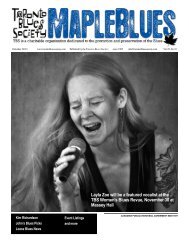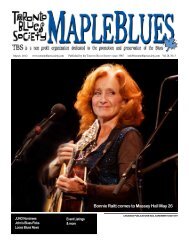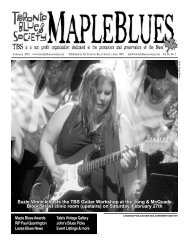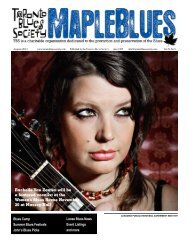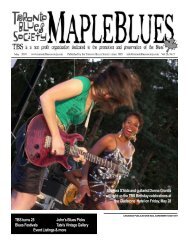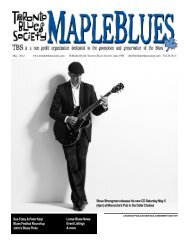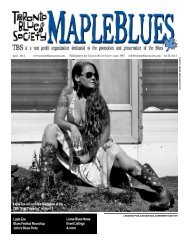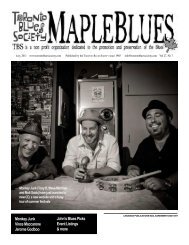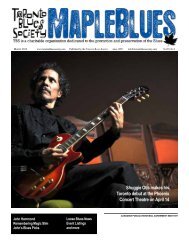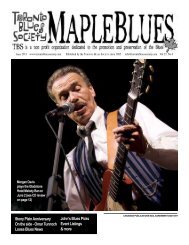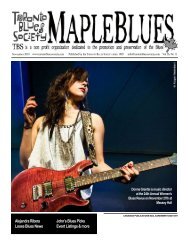Harmonica Workshop Loose Blues News Tate's Vintage Gallery ...
Harmonica Workshop Loose Blues News Tate's Vintage Gallery ...
Harmonica Workshop Loose Blues News Tate's Vintage Gallery ...
Create successful ePaper yourself
Turn your PDF publications into a flip-book with our unique Google optimized e-Paper software.
Illustration by Nathaniel Mesner<br />
Suzie Vinnick Me ‘n Mabel Outside<br />
Multiple Maple <strong>Blues</strong> Award winning vocalist<br />
Suzie Vinnick’s latest project is a (mostly) solo<br />
acoustic blues album. Mabel is her Larrivée<br />
acoustic guitar and those of you who still think<br />
of Suzie as primarily a singer will be pleasantly<br />
surprised at her facility with Mabel. This is her<br />
fourth solo disc, with a rather larger group of<br />
collaborative efforts rounding out her discography.<br />
She is also an A-list recording session vocalist.<br />
Some of her collaborators help out here as well.<br />
The generous program consists of songs she &<br />
Mabel love to play. These include some favourites<br />
by others plus a selection of her own compositions<br />
from those preceding discs. Hearing her in such an<br />
unadorned setting is the perfect way to appreciate<br />
that award-winning voice. It also allows us to focus<br />
on her songs. “Sometimes I Think I Can Fly”, for<br />
instance, is from The Marigolds Juno-nominated<br />
That’s The State I’m In. The solo acoustic version<br />
gives it another perspective. The delightful “The<br />
Honey I Want” was a joint contribution to a<br />
Betty & The Bobs disc in 2005. That version is<br />
also on the TBS 20 th Anniversary set. Here she’s<br />
joined by Roly Platt on harmonica - an excellent<br />
way of being reminded about a very good tune.<br />
“Get Some” is a solid blues co-written with Rita<br />
Chiarelli. “Oreo Cookie <strong>Blues</strong>” is a Lonnie<br />
Mack song she’s been performing since her first<br />
CD, Angel In The Sidelines from 1994 where<br />
it was done with a full band. This solo acoustic<br />
version benefits enormously from that performing<br />
history and she nails the guitar solo. Bo Diddley’s<br />
“I Can Tell” gets guitar support from Tony D. Roy<br />
Forbes’ “Crazy ‘Bout Lovin’ Me” features Rick<br />
Fines. Slim Harpo’s “Queen Bee”, Bob Dylan’s<br />
“Quit Your Lowdown Ways” and Willie Dixon’s<br />
“You’ll Be Mine”, written for Howlin’ Wolf are<br />
also highlights on this stunning disc. Performing<br />
live, she adds song histories and stories that add<br />
immeasurably to the show and you can hear them<br />
and the songs at Hugh’s Room on April 23.<br />
Sunday Wilde What Man!?? Oh That Man<br />
Self<br />
Sunday Wilde, aka Ange Sponchia, hails<br />
from Atikokan and is a mean barrelhouse piano<br />
player. She also writes good songs and sings<br />
them in a brash, confident style. Several of the<br />
songs here revel in the theme of the title, with the<br />
opener, “That Man Drives Me Mad”, “Show Me<br />
A Man”, “Manning Street Sweet Talker” & “I<br />
Can’t Shake That Guy” being fine new examples<br />
of a theme with a long history. It’s not all she does<br />
though, with “Sunday’s Midnight <strong>Blues</strong>” being<br />
a slow, jazzy & quite original composition on<br />
that subject. “My Baby’s Dead” is perhaps the<br />
most unusual song, done in a gypsy style and<br />
at a nightmare clip. Bessie Smith’s “Sorrowful<br />
<strong>Blues</strong>” is the only cover, and she adapts that to<br />
her style very nicely. Ronnie Hayward provides<br />
imaginative support on acoustic bass and David<br />
West contributes assertively on various guitars.<br />
The result transcends mere accompaniment,<br />
making for a very lively disc indeed. Her web<br />
site has audio samples and much more: www.<br />
myspace.com/renojacksundaywilde.<br />
Rory Block Shake ‘Em On Down Stony<br />
Plain/Warner<br />
Fred McDowell was perhaps the greatest<br />
bluesman discovered in the post war period. Many<br />
of the greats were re-discovered then and some<br />
even came close to achieving the level of their<br />
early years. But Lomax’s 1959 field recordings<br />
revealed a master. For Rory Block’s fourth<br />
edition in her Mentor Series she acknowledges<br />
a bluesman who made a great impression on her<br />
when, as a fifteen year old guitar student, she met<br />
him in California. As she says in her informative<br />
liner notes, she began the project with learning<br />
to play each song exactly as he did and that as<br />
she did so, various new directions unfolded.<br />
8 Maple<strong>Blues</strong> March 2011 www.torontobluessociety.com<br />
She ended up adding chords to his songs and<br />
writing four new songs based on elements of his<br />
music, songs that are about McDowell instead<br />
of versions of his songs. It may be heresy to say<br />
so but McDowell did not have a lot of variety<br />
in his music. This did not matter to the dancers<br />
in Como, MS but yet another CD of his songs<br />
would not have satisfied many of those of us more<br />
used to recorded entertainment, a different setting<br />
entirely. Block’s creativity not only surmounted<br />
that problem, it aided immeasurably in paying<br />
tribute to the man. She also decided to stick to<br />
acoustic slide guitars and uses guitar overdubs<br />
freely. The CD opens with her most adventurous<br />
creation: “Steady Freddie” uses his own words,<br />
in the first person. “Mississippi Man” is a bit of<br />
a reversal, with Block singing about that meeting<br />
with McDowell. This song is a free download at<br />
www.stonyplainrecords.com. “Kokomo <strong>Blues</strong>” is<br />
the first song then that is a McDowell song and her<br />
version is most definitely not a literal one – as she<br />
mentions, that one is in our heads anyway. “Good<br />
Morning Little School Girl” is gender switched and<br />
her explanation for doing the song is on the mark.<br />
“Shake ‘Em On Down” is perhaps McDowell’s<br />
most famous song & Block does not disappoint.<br />
Her version is closer to McDowell’s except for<br />
the use of a choir, a technique she used on earlier<br />
albums in the series. Her use of overdubbed guitar<br />
parts is often mesmerizing. McDowell’s was more<br />
direct, often doubling the vocal line. “Ancestral<br />
Home” is another original, this time McDowell’s<br />
music brought forth memories of listening to an<br />
African song as a child, the partially remembered<br />
words defied research, so she just incorporated<br />
them. “The Breadline” uses McDowell’s music<br />
to bring us right into the present with strong<br />
lyrics about the current Great Recession. She has<br />
also written an eBook, an autobiography called<br />
‘When A Woman Gets The <strong>Blues</strong>’ which is only<br />
available at her web site. There’s a chapter for each<br />
of the bluesmen in her Mentor Series, twelve in<br />
total, that she hopes to make available as a CD<br />
box set. This chapter is a remarkably ambitious<br />
and successful disc, the project should be quite<br />
an achievement when it’s complete. Her web site<br />
is www.roryblock.com.



